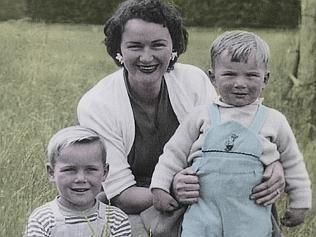Poet Peter Rose revisits loss in The Subject of Feeling
In key poems in this collection, Peter Rose addresses the accident that left his brother a quadriplegic.

Peter Rose’s writing has over the years described an irregular orbit around loss: sometimes travelling close to it, unable to look away, and sometimes swinging outwards, viewing it more by analogy and refraction, as in his previous book of poetry, Crimson Crop.
In his new collection, Rose has gone back to the source, to the specifics of loss, and in particular the accident that left his brother Robert, a promising athlete, a quadriplegic and changed the family forever.
The cover shows an evocatively tinted photograph of the young brothers Rose and their smiling mother under the title, The Subject of Feeling. It conveys with a rare completeness the essence of the book, especially because almost the same photo, but with their father, appeared on the original cover of Rose Boys, Rose’s 2001 memoir and encomium for Robert.
The quizzical way the very young Peter seems to be looking at the world is a fair clue to the way his verse often views life. And all this before you even open the book.
The gravitational centre of The Subject of Feeling is a short section containing the title poem and just four others: a kind of reprise of memory and grief, like a visit home.
It is the precision that makes it so magnetic and informative.
As emergency crews work to slowly free Robert from his wrecked car: “Eschatology is a slow / remorseless science” and, a little later, “Then the subject of feeling — / why you had none in your feet. / Men ground the car with steel / and flung it open / like a sack of wheat.” The subject matter, and the unexpected rhyme, combine to sandbag the reader.
In the longer poem Tiles the image of Robert, paralysed in his hospital bed, counting the ceiling tiles to stay sane, is a tribute to his stoicism and determination, and also tragic, because: “The statistician in the family, / the boy who only lived to score, / could never get it right / however hard he tried, / however carefully and needfully. / The mystery of it would never square. / Never, never, never, never, never.”
Further out into space, Peter Rose, the long-time editor of Australian Book Review, passes regularly by other topics of lesser gravity. He is often out and about, observing, through a rueful prism, seemingly innocuous goings on: ‘‘That man in the park, / phlegmatic newcomer / with a Plantagenet cut, / still bleary this morning, / his turn to entertain the tot.’’ This explosion of consonants is a warning, and by the time Rose has finished with this hung-over dad the scene is like something from Michelangelo Antonioni’s Blow-up.
Or, worn out from editing and proofing, watching cricket and reading a biography of Harold Pinter, conjuring up a cashmere-wearing (and, as we know, cricket-loving) Beckett, “… ever more gnomic. / ‘Won’t you stop talking?’ / he says to a bolshie actress / and then plays Haydn at the party.”
Poems like this are reminiscent of Peter Tyndall’s never-ending art series A Person Looks At a Work of Art / someone looks at something ... but, as with Tyndall, Rose always finds a new angle, and the charm of the notion makes the poem non-referential, autonomous. Like Peter Porter, he is generous with allusion, but it is the armature of the poems that really does the work.
Moving through the book, it feels as if the intensity of feeling in the poems of remembrance has spread out like an old ache: where there is ennui, it is more pronounced; longing, more pained. His mini-biography cum elegy to Maria Callas mixes ornate emotion and pedestrian reality in a way that takes it far beyond aesthetics. A yearned-after athlete from long ago queues up for the poet’s autograph at a book signing, triggering an avalanche of longing from decades, even centuries, past.
So it is that Catullus, topping the bill and taking several encores, as he has done in so many of Rose’s books, seems more het up than enervated this time around. Professor Socration still pompously annoys, and the usual envious, malodorous rivals try to rain on Catullus’s parade: but this time there’s a touch of Joe Orton among the faux-classical bitchery and dalliance. Lesbia, though, is as enthralling as ever, and their tryst in a laneway bar is the perfect antidote.
If Catullus is desperately trying to hang on to something — fame, beauty, wit, an ideal of love — he is still fortunate in his desperation because he can, in the end, just let go. Some things, as Rose reminds us so arrestingly, can never be relinquished. Never, never, never, never, never.
Peter Kenneally is a poet and critic.
The Subject of Feeling
By Peter Rose
UWA Publishing, 78pp, $24.99



To join the conversation, please log in. Don't have an account? Register
Join the conversation, you are commenting as Logout